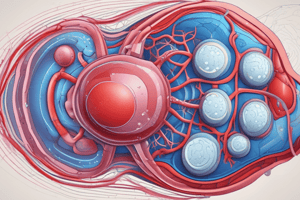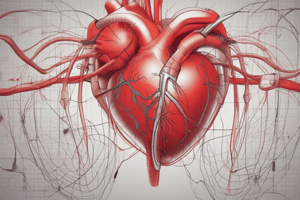Podcast
Questions and Answers
What is a common factor that contributes to high blood pressure in obese individuals?
What is a common factor that contributes to high blood pressure in obese individuals?
- Increased atherosclerosis (correct)
- Improved vasodilation
- Decreased atherosclerosis
- Enhanced venous return
Which of the following medications can increase blood pressure?
Which of the following medications can increase blood pressure?
- Hypotensive agents
- Many medicines (correct)
- Antihypertensive medications
- Blood thinners
What is the typical pattern of diurnal variations in blood pressure?
What is the typical pattern of diurnal variations in blood pressure?
- Lowest in the morning, highest in the evening (correct)
- Has no consistent pattern
- Highest in the morning, lowest in the evening
- Remains constant throughout the day
How does nicotine affect blood pressure?
How does nicotine affect blood pressure?
What is the term for a sudden decrease in blood pressure when standing up from a lying down position?
What is the term for a sudden decrease in blood pressure when standing up from a lying down position?
How does posture affect blood pressure?
How does posture affect blood pressure?
What is the effect of haemorrhage on blood pressure?
What is the effect of haemorrhage on blood pressure?
What is the effect of increased intracranial pressure on blood pressure?
What is the effect of increased intracranial pressure on blood pressure?
When should a nurse postpone taking a client's blood pressure?
When should a nurse postpone taking a client's blood pressure?
On which arm should a nurse not take a blood pressure reading?
On which arm should a nurse not take a blood pressure reading?
Why is it important to explain the blood pressure taking procedure to the client?
Why is it important to explain the blood pressure taking procedure to the client?
In which position should a client be placed for accurate blood pressure reading?
In which position should a client be placed for accurate blood pressure reading?
What is the average normal blood pressure of a healthy adult?
What is the average normal blood pressure of a healthy adult?
What is the term for an abnormally high blood pressure?
What is the term for an abnormally high blood pressure?
What is the term for the pressure when the ventricles are at rest?
What is the term for the pressure when the ventricles are at rest?
What is the effect of exercise on blood pressure?
What is the effect of exercise on blood pressure?
What is the difference in blood pressure between males and females?
What is the difference in blood pressure between males and females?
What is the blood pressure of a newborn?
What is the blood pressure of a newborn?
Flashcards are hidden until you start studying
Study Notes
Factors Affecting Blood Pressure
- Haemorrhage decreases blood pressure by reducing blood volume in blood vessels
- Increased intracranial pressure increases blood pressure, e.g., head injury and intracranial tumors
Nurse's Responsibility in Measuring Blood Pressure
- Identify the client and check diagnosis, reason for taking blood pressure, and previous measurements
- Assess the client's physical and mental state, and postpone measurement if the client is angry, anxious, in pain, or crying
- Choose the correct arm for measurement, avoiding arms with intravenous infusion, injury, disease, shunt, or fistula for renal dialysis
- Check the blood pressure apparatus for defects
- Explain the procedure to the client to gain confidence and cooperation
- Place the client in a comfortable position, either lying down or sitting, with the arm supported at heart level
Hormonal Factors
- Increased levels of adrenaline, noradrenaline, and thyroid hormones increase blood pressure
Other Factors Affecting Blood Pressure
- Stress increases blood pressure due to stimulation of the sympathetic nervous system
- Severe pain can decrease blood pressure and cause shock
- Sleep decreases blood pressure due to reduced venous return
- Obesity can increase blood pressure in some individuals due to atherosclerosis
- Medication can increase blood pressure
- Diurnal variations cause blood pressure to be lowest in the morning and highest in the late afternoon or early evening
- Disease processes affecting cardiac output, blood viscosity, or arterial compliance can affect blood pressure
- Smoking increases blood pressure due to nicotine's effect on capillaries
- Posture affects blood pressure, with a decrease in blood pressure when lying down compared to sitting or standing
- Orthostatic hypotension is a sudden decrease in blood pressure when standing up
Blood Pressure Measurement
- Blood pressure is measured in millimeters of mercury (mmHg)
- The systolic pressure is written over the diastolic pressure, e.g., 120/80mmHg
- The average normal blood pressure of a healthy adult is 120/80mmHg
Blood Pressure Conditions
- Hypertension is an abnormally high blood pressure above 140mmHg systolic and 90mmHg diastolic
- Hypotension is an abnormally low blood pressure below 80mmHg systolic
Age-Related Factors
- Blood pressure increases with age
- The pressure is higher in elderly individuals than in children
- This is due to atherosclerosis
- Newborn: 73/55mmHg, 1 year: 90/55mmHg, 6 years: 95/57mmHg, 10 years: 102/62mmHg, 14 years: 120/80mmHg, Adults: 120/80mmHg
Other Factors
- Exercise increases blood pressure due to increased venous return
- Emotions increase blood pressure due to secretion of adrenaline and noradrenaline
- Sex: blood pressure is higher in males than in females due to hormones, but equalizes at menopause
Studying That Suits You
Use AI to generate personalized quizzes and flashcards to suit your learning preferences.




